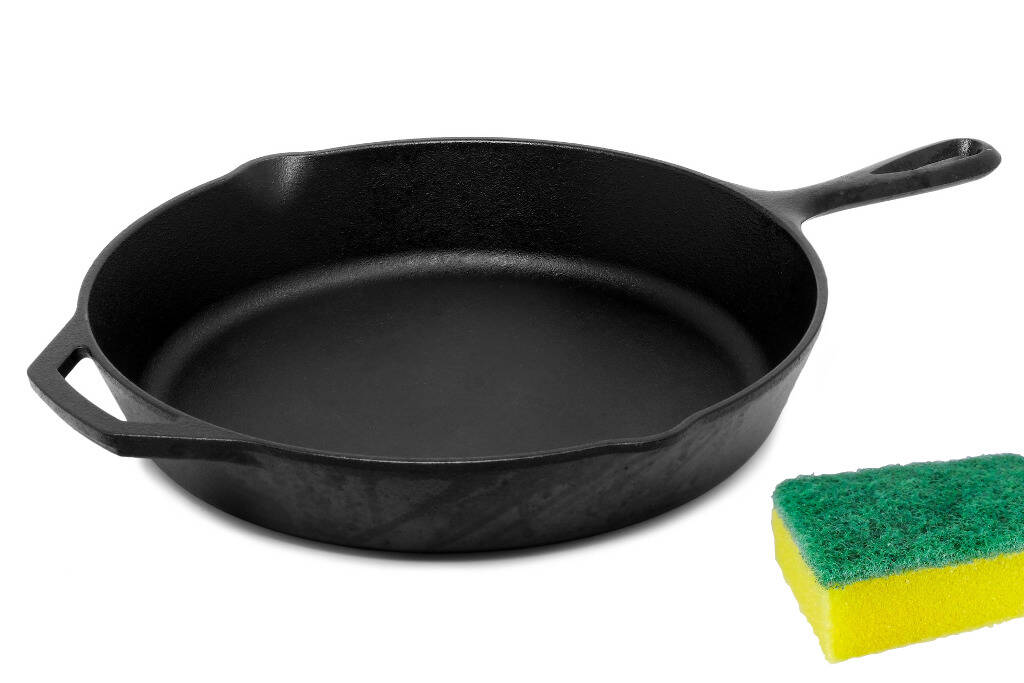A cast-iron skillet is an even-bottomed frying pan primarily used for frying, sautéing, searing, baking, braising, broiling, roasting, browning, and other cooking techniques. It is called cast-iron because of the material used for creating the cookware. A cast iron is an alloy of iron and carbon where carbon content is more than 2%.
The cast-iron skillet and other cookware made of cast-iron became popular in the 20th century because of its affordability, durability, and heat retention properties, making it ideal for cooking food. Cast-iron skillets are seasoned to make it corrosion resistant and protect it from rust. It is also used to create stick-resistant coating so that food will not stick or get glued on its surface when cooking.
After using the cast-iron skillet, let it cool down first before cleaning. To clean the cookware, simply rinse it with hot running water and use a soft brush to remove crumbs of food that got stuck on the surface. You can use a small amount of dishwashing soap to disinfect the surface, the handles, and remove the scent of food. Rinse it again with warm water and use a lint-free cloth or paper towels to wipe it clean and dry. Leave it to dry in air for a few minutes then apply a thin coat of oil on its surface. Keep the cookware in a clean, dry storage place.
Seasoning involves putting heated fat or oil on the surface of the cookware. If a cast-iron skillet is regularly seasoned, the longer the cookware will last, and the more efficient it can be when used for cooking as well as creating the better flavor of whatever you are cooking.
Below you’ll find a compiled list of the most asked questions and answers on cast-iron skillet upkeep.
Should You Wash a Cast-Iron Skillet?
Yes, you should wash your iron skillet or any other cookware for that matter after use. The need to wash all cookware and utensils is a must for health reasons. Keeping cookware clean will prevent bacteria and germs from growing in your cookware, which can cause foodborne diseases. Moreover, cookware and other kitchen and dining utensils that have not been systematically cleaned will attract pests like cockroaches, mice, rats, and other creatures or insects that primarily feed on food scraps. These pests can carry diseases and can cause serious health hazards to you and your family.
Should You Wash a Cast-Iron Skillet After Every Use?
It really depends. If you are going to use the cast-iron skillet to fry the same dish or food a few minutes later to serve a hot meal, it may not be necessary to clean the cast-iron after use. Washing won’t be practical.
However, you need to wash the cast-iron skillet after its use if you plan, for instance, to fry a different dish, or if your next use of the cookware is after several hours. Instead of washing for cooking in succession, you can also simply wipe food or fat residues using a paper towel.
What Happens If You Use Soap on Cast-Iron?
Because soap is designed to remove oil, people think that using soap on cast-iron would damage the seasoning on its surface. The belief that you should not wash your cast-iron skillet with soap is just a myth.
A few amounts of soap cannot completely absolutely wash away that seasoning that you put in the iron cast. The non-stick surface is maintained.
The use of dishwashing soap is actually important to remove the smell of food and disinfect the cookware. Remember that the scent of food alone can attract pests. Once you have rinsed the soap, you can apply or bake another thin layer of seasoning to coat the skillet’s surface.
Can You Put a Cast-Iron Skillet in the Dishwasher?
It is not advisable to put your cast-iron in the dishwasher. It would be better if you clean the cookware by hand. This is because you don’t have control over how the dishwasher cleans the skillet.
The scrubbing action and the strong detergent can effectively damage the seasoning on the surface. Moreover, the dishwasher scrub’s abrasions can potentially be areas where rust will accumulate when you air-dry the skillet.
What Is the Black Residue on a Cast-Iron Skillet?
The black residue on your cast-iron skillet is burnt fatty food debris that gets stuck to the seasoned oil. The appearance of this black residue is mainly caused by food sticking on the surface of the skillet. This means that your skillet lacks proper seasoning or coating, and that’s why food being cooked sticks to the surface and gets charred in the long run.
The black residue can decrease the skillet’s efficiency and cause a charred flavor to the successive food that you cook in the cookware. To prevent these black deposits from happening, you should ensure that your seasoning or oil coating on the pan’s surface is sufficient.
If the black residue has become a stain and you have been using your cookware for years, it means that you should replace your cast-iron cookware.
How Do You Get the Black Residue off Your Cast-Iron Skillet?
To get rid of the stubborn black residue off your cast-iron skillet, scrub the pan using a mixture of oil and salt. Simply pour the mixture on the skillet’s surface, leave it there for a few seconds, and then start scrubbing the residue using a paper towel. Repeat the process until all residues are gone.
An alternative way to remove that bothersome residue is to loosen it by boiling water in the pan. Once the residues are unattached, you can then wipe them off with warm water, and a small amount of soap then rinse it.
A more aggressive approach is to use baking soda in combination with a bit of hot water. Leave the mixture on the affected area for a bit so that the chemical reaction has time to start.
How Do You Take Care of a Cast-Iron Skillet?
Proper maintenance is always the best way to take care of your things, including your tools, cars, and even your cookware to make them last longer.
In the case of your iron cast skillet, make sure that you clean the cookware after use. Dry it completely every time to prevent rust from forming. You should also season its surface before storing it to reinforce its non-sticking properties. Finally, you should place it in a clean, dry, and secure storage cabinet, where pests cannot reach it.
Can You Clean a Cast-Iron with a Wire Brush or Cleaning Wire?
You should avoid using a wire brush for cleaning your cast-iron skillet. A wire brush is usually made up of steel, which is primarily used to remove rust and remove paint.
The strong abrasive features of a wire brush can strip or damage the skillet’s seasoned surface. Similarly, you should avoid using sandpaper to clean your cast-iron cookware, especially on its surface.
Instead, you should use a non-metal brush such as a nylon bristle scrub brush and nonabrasive sponge scrub to clean the cast-iron and remove food residues.
You can use a wire brush to remove rust on your skillet that appears on the sides, handles, or any other area of the pan but not on the non-stick cooking surface.
Do You Season Cast-Iron After Every Use?
Yes, you should season your cast-iron after every use. Even if your cast-iron is new, seasoning regularly for added protection would help maintain its non-stick coating and lengthen its utility.
To season, heat the skillet on your stove. When it’s hot, which is indicated by smoke appearing on the surface, rub a little oil onto the surface and let it cool down. Reiterate this procedure a few times, and this will ensure that the non-stick coating of the skillet is well preserved.
How Do You Clean a Cast-Iron Skillet Before the First Use?
Brand new cast-iron skillets are generally ready for use. However, you still need to clean it before actually using it for cooking food. The cookware may have accumulated some dust and other tiny particles while in storage or may have been touched by some shoppers.
To ensure that the skillet is dirt-free before use, you can clean the skillet by rinsing it with warm water and drying it with linen cloth or paper towel before using it.
Can You Soak a Cast-Iron Skillet?
You can soak a cast-iron for a few minutes but not very long. Cast-iron cookware is sometimes soaked in warm water for a few minutes to loosen and remove food stuck on the surface. However, soaking the same in the sink overnight can potentially cause the skillet to acquire rusts that, in turn, can corrode the surface metal.
Is Vinegar Bad for Cast-Iron?
No, vinegar is not bad for cast-iron. There is nothing to worry about diluting food (i.e., meat sediments) with vinegar or wine for that matter as long as the skillet is sufficiently seasoned. The acetic acid (vinegar) or alcohol (wine) cannot penetrate the pan’s seasoned coating.
On the contrary, vinegar diluted with water is actually used for removing rust in an iron cast skillet.
Does Vinegar Remove Rust from Cast-Iron?
Yes, vinegar is generally used for removing rust. Acetic acid will chemically react with iron oxide (rust) to form a soluble salt called iron acetate. This, in effect, will loosen the rust that sticks on iron material.
In case of removing rust on a cast-iron pan, you need to make a mixture of water and vinegar and pour it on the pan. Leave it for a few hours to give it time for the acid to react with the rust. After this, you can easily scrub off the rust off the iron cast using a sponge to make the cast-iron glowing like brand new.
Is Rust on Cast-Iron Dangerous?
It depends on the amount of rust. Inadvertently consuming rust that forms on iron cast pans is generally not poisonous because they are taken in small quantities. In fact, it can even be beneficial to people who suffer from iron deficiency. Moreover, no study has been made showing significant health issues relating to food cooked in a rusted pan. Thus, eating a little bit of rust that comes from your iron cast pan is not harmful.
However, the consumption of rust in excessive quantities is fatal, leading to iron poisoning.
Despite this, it is still prudent to remove rust from your iron cast pan before using it for cooking. After all, small amounts of rust can easily be removed and can also affect the meal’s flavor.
Summing Up
It is imperative to clean and upkeep your cast-iron skillet and other cookware not only for aesthetic reasons. More importantly, keeping cookware clean is essential for ensuring healthy and hygienic food preparation, maintaining cooking efficiency, preventing depreciation, and extending the useful life of your cookware

